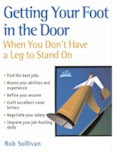I frequently receive calls from people who either want help writing their résumé or simply want someone to do it for them. Most people seem somewhat surprised when I share my belief that having someone else write their résumé is a waste of time and money.
Why? Two reasons.
First, informal research as well as my experience as a career coach and former recruiter tells me that most résumés--well over 95%--are completely ineffective. If the thousands of résumé writing services in the world were doing a good job, that wouldn't be the case. Second, the only person who truly knows the details of the experiences and accomplishments is you.
Until we can download our entire life experience from our brain to someone else's (isn't that a scary thought), you simply can't throw money at the problem and expect to get a good result. A far better approach is to work with a coach who can ask the right questions and help you quantify your experience in a meaningful, compelling way. It has to be a TEAM EFFORT. More importantly, you, the person working on the résumé, has to be willing to commit to a thorough self-assessment. Sadly, most people aren't willing to spend the time and effort.
It has always amazed me that people will spend hundreds of dollars and weeks of their lives taking Kaplan tests in an effort to get a higher score on the SAT, ACT, GRE, LSAT, GMAT, MCAT, and countless other tests, but they balk at the idea of spending a single afternoon reflecting on their experiences and quantifying their accomplishments. This is exactly backwards.
When A Résumé Isn't The Best Tool
It also fascinates me that people expect résumés to perform miracles. The fact is, there is a limit to what a résumé can do. For example, I have worked with countless clients who spent a decade or two in one position before they decided to pursue a completely different job in a completely different industry. More often than not, our first conversation started like this:
"Rob, I got your name from ______ who suggested I give you a call. I really need help with my résumé..."
To understand why this reasoning doesn't make any sense, think about what a résumé is. People familiar with my work have no doubt heard me say this before, but it bears repeating. The way dictionaries define résumé is incorrect. According to dictionary.com, the word résumé is defined as follows:
1. a summing up; summary.
2. a brief written account of personal, educational, and professional qualifications and experience, as that prepared by an applicant for a job.
That is NOT what a résumé is. Instead, I propose an alternate definition:
The accomplishments of your life, outlined briefly on a few pages, as they relate to what you want to do (i.e., the next logical step in your professional development).
No matter which definition you use, a résumé is of little use to someone who wants to change careers for one simple reason:
The résumé can't tell the story.
For example, when I changed careers from advertising to options trading, not a single accomplishment or experience I had at Leo Burnett, no matter how impressive, supported my decision to change careers. In other words, the story of why option trading made sense did not come across in a résumé. It did, however, come across quite well in a cover letter where I could easily communicate the three key qualities: Passion, Initiative, and Resourcefulness. Like many career changers, the evidence I could offer that what I wanted to do made sense and, more importantly, didn't represent a risk from the employer's point-of-view, was found in what I learned from mentors and experienced on my own initiative. The evidence didn't come from my past employment or even my educational background.
Think about this next time you want to change careers. Ask yourself what evidence most strongly supports your desired outcome. Chances are, it won't be on the résumé.
Sunday, February 10, 2008
Subscribe to:
Post Comments (Atom)

.jpg)
1 comment:
This is great info to know.
Post a Comment